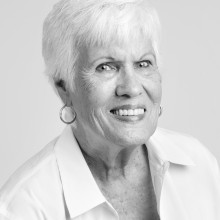
Bettye Anding
When a sprig of 23 came to work in our newsroom in the late ‘70s, she overheard another journalist and me talking about Claudette Colbert.
“Who’s that — some jet-setter?” she asked, flummoxing yours truly, almost 20 years her senior, and the other woman, at least three decades mine.
Her ignorance of this film superstar of the ‘30s, ‘40s and ‘50s wasn’t entirely her fault; it wasn’t until 1994 that Turner Classic Movies was launched and began providing fans of that cable TV channel with a historical perspective on Hollywood. Courtesy of TCM, even folks her age and younger now know some of the Colbert flicks, and 16-year-old boys like my grandson have become fans of John Wayne.
Yep, fame isn’t as fleeting as it used to be.
I got to thinking about that the other day while visiting a sister in Washington state, and being urged by her daughter to tell her own teenaged youngsters about some of the celebrities I’d interviewed as a newspaper reporter.
“I don’t think they’ll know who any of them are,” I said, thinking about actors like William Holden and Paul Newman and Rex Harrison, and those who made big headlines like moon walker Buzz Aldrin did.
“Well, tell them about Elvis Presley,” she urged, and both kids gave squeals of delight.
That speaks to the enduring quality of the fame of those who make pop music; the music makers/song singers don‘t need TCM to keep their work alive. And it got me to wondering whether I’d be able, were I here 35 years from now, to connect with the names and faces of those currently “on the charts.”
That’s a “no.” When my grandsons tell me which artists they think worthy of their treks to Jazz Fest sound stages, they’re as unknown to me as Claudette Colbert was to “the sprig.” and not because said performers aren’t hot right now. I just seem to have tuned out — a while back.
When I got to thinking about that, I realized that almost everybody does. A check with my 50-something daughter turned up the fact that her husband’s music appreciation peaked with the Beatles, and those are the guys to whom he still prefers to listen. She offered up the ‘70s as the era with the music she finds most appealing; “it’s what we heard as teenagers that we like best,” she said.
When it comes to music, we look — or listen — back, it seems. Those who grew up with the Beatles can still love Chuck Berry and Sinatra as I do. Going as far back as Cole Porter would be a stretch, but some do it.
When I was about 19 — the same age as Elvis — my parents’ comments about his career were disapproving. His music was new to them, borrowed from a culture they didn‘t understand, with moves they thought crude and suggestive — nothing like the grace of Astaire and Rodgers dancing to the fluid beat of a Gershwin.
I knew that I had joined the older generation, musically speaking, about 25 years ago. On a morning stroll through our neighborhood, I passed a teenager immersed in cleaning his car to the beat of a rap artist. I found the music uninteresting and the lewd lyrics made me want to demand that he at least turn down the volume on his booming speakers.
“I’ve become my mother,” I thought, echoing the knowledge that comes to most of us, and I walked on.
Bettye Anding is a former editor of the Living section of The Times Picayune, for which she wrote “Silver Threads” until her retirement. Email comments to her at btanding@cox.net.
 NOLAbeings Multimedia artist Claire Bangser created NOLAbeings as a portrait-based story project that marries...
NOLAbeings Multimedia artist Claire Bangser created NOLAbeings as a portrait-based story project that marries...  Voodoo in New Orleans: Reviving history: New Orleans fortune telling This article takes a deep dive into the history of Voodoo in New Orleans, its hybridization with Catholicism, and its present-day place in the city's culture. The author visits fortune-tellers in the French Quarter, using their guidance as a tool for introspection rather than a deterministic predictor of the future. Through her experiences in New Orleans, the author feels a mystical connection to both the past and the future.
Voodoo in New Orleans: Reviving history: New Orleans fortune telling This article takes a deep dive into the history of Voodoo in New Orleans, its hybridization with Catholicism, and its present-day place in the city's culture. The author visits fortune-tellers in the French Quarter, using their guidance as a tool for introspection rather than a deterministic predictor of the future. Through her experiences in New Orleans, the author feels a mystical connection to both the past and the future. 